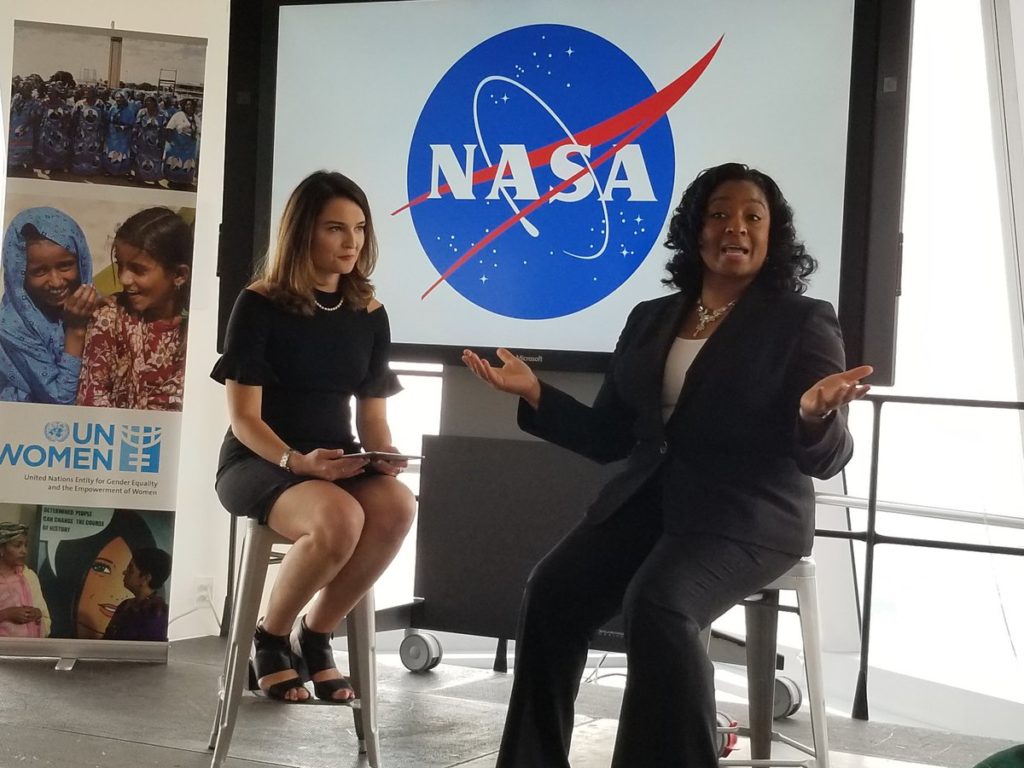When Dr. Christyl Johnson was a child, she watched the Apollo 11 moon landing and decided she wanted to be an astronaut one day. In an interview with Future Self Series, Dr. Johnson recalls that her parents told her, “If that’s what you want to be, you know you could do it. You just have to put your mind to it and, once you decide, you have to make it happen.” Their encouragement helped Dr. Johnson realize a motto that has guided her career: “If it’s to be, it’s up to me. I have to make this so.” As an undergraduate at Lincoln University, Dr. Johnson was accepted into the school’s Lincoln University Advanced Science and Engineering Reinforcement (LASER) Program where she was introduced to physics. Dr. Johnson went on to receive her bachelor’s degree in physics from Lincoln University, a master’s degree in electrical engineering from Pennsylvania State University and a Ph.D. in systems engineering from George Washington University. Dr. Johnson is now deputy director for technology and research investments at National Aeronautics and Space Administration’s Goddard Space Flight Center where she is responsible for managing the center’s research and development portfolio, formulating the center’s technology goals and leading investment programs that meet those goals. Dr. Johnson is also dedicated to inspiring women and girls to pursue careers in Science, Technology, Engineering and Mathematics (STEM), a topic she mentioned when she was interviewed for the Advancing Women in STEM session at the 2017 United Nations Women Global Innovation, Technology and Entrepreneurship Industry Forum in New York City. I met with Dr. Johnson before her session to discuss her career path and advice.

What are your responsibilities as deputy director for technology and research investments at NASA?
I’m responsible for charting the path for the future for our center. That means deciding what kind of science missions we are going to conduct in astrophysics, Earth science, planetary science and heliophysics, and then developing an integrated investment plan to make sure we have the right technology in place to enable those future missions.
What are the most important characteristics someone needs to be successful in your role?
You definitely have to have confidence in who you are and the ability to project your confidence – and they are two separate things. You have to know yourself and the unique value that you bring to the table, and don’t let anyone change that. There will be people who will not support you, and may even try to undermine you, but you have to stand firm in the fact that you deserve to be where you are. That’s where the confidence comes in. If you don’t have confidence in your ability, it will be hard for anyone else to have confidence in you. Be firm in who you are and then be able to project that confidence, and you will be able to stand any situation that comes your way. That is really important.
What’s the biggest lesson you’ve learned at work and how did you learn it?
Women bring to the table an amazing, unique perspective that should absolutely be celebrated. I learned that when I was a manager for a team. We were about ready to fly an instrument on an aircraft, but we had a really big problem and I had to pull a tiger team together to figure how to address this line-locking issue.
We had a chief engineer who was a senior level person in our organization. He was a white male with a really strong and bold personality. He would walk into the laboratory and tell the engineers that were under me, “You need to try this. Tweak this over here. Make this adjustment.” I said, “You can’t just walk in and do that.” When you have a problem and you don’t know what’s causing that problem, you need to be methodical about what you change so that you can pinpoint exactly what caused the problem and exactly what needs to be done to fix it. His response was, “I can do whatever I want to do. I’m the chief engineer.” I thought to myself, “Okay. I’m not going to sit here and argue with this guy because I’m a low-level engineer in the organization. I’ll take this to my supervisor to see how he wants to handle it.”
After talking to my supervisor, he decided to bring all the division management team members together to have a conversation with him. He started by saying, “We are on the line here as a center. If we don’t get this thing delivered on time, we’re in trouble. You can’t interrupt the team while they are trying to fix this.” The chief engineer said “I can do whatever I want. Even the division director can’t tell me what to do because I’m the chief engineer, and what I say goes.”
When he said that, the other men at the table became very angry. They started yelling at each other, and it got to the point where they weren’t even listening to each other anymore. As the only woman in the room, I said, “Gentlemen, gentlemen, hold on…as long as we know the rules of the game, we can play it.” They looked at me with a puzzled look on their faces, and said, “What do you mean?” I said, “If he says he’s just going to walk into the lab, do whatever he wants, say whatever he wants to our engineers and not follow any rules, all we have to do is tell everybody in the lab not to listen to him. Period. Just to totally ignore him.”
I left and went to prepare my team. He walked in and started telling them what to do, but they kept on working and ignored him like he wasn’t even talking. He left. Then he came back another time to try it again. Same thing happened. He left. We solved the problem because I was looking at it from a totally different vantage point. I wasn’t one of the guys in the room that was looking at it from a male-to-male, alpha-to-alpha perspective. I was able to step back from the situation and say, “Here’s a totally different solution set. Let’s try it.” It worked.
What advice do you have for young women in STEM careers?
You’ve got to make sure that you network. That is one of the most important things you can do in any technical field. Women come to the table with a wealth of knowledge and a wealth of skills. When it comes to getting the high-priority assignments, promotions, equal pay or just advice about your career path, you can benefit significantly by having mentors that are where you are trying to go and can share some of the lessons they have learned and help open doors for you along the way. You should also have a network of other women (and men) that will support you on your journey. Don’t try to go it alone.
How would you advise someone on finding a mentor and establishing a mentor and mentee relationship?
You definitely want to find someone who has been where you are now and who is now where you want to be. That is one of the first things that you look for. Envision yourself five years from now. Where do you want to be? What is it you want to be doing? What kind of environment do you want to be in? Look for someone in that environment and go approach her. You have to be very strategic about who you target for your mentors. I would also say look for those people who have a track record of helping women.
Talk to other women. Find men and women who have been successful in helping women progress through their careers, and try to connect with those people. Find women who have been helped by others because they know what it takes. They know what it felt like when the help was really good, and they can provide that same kind of help if they’re willing.
































